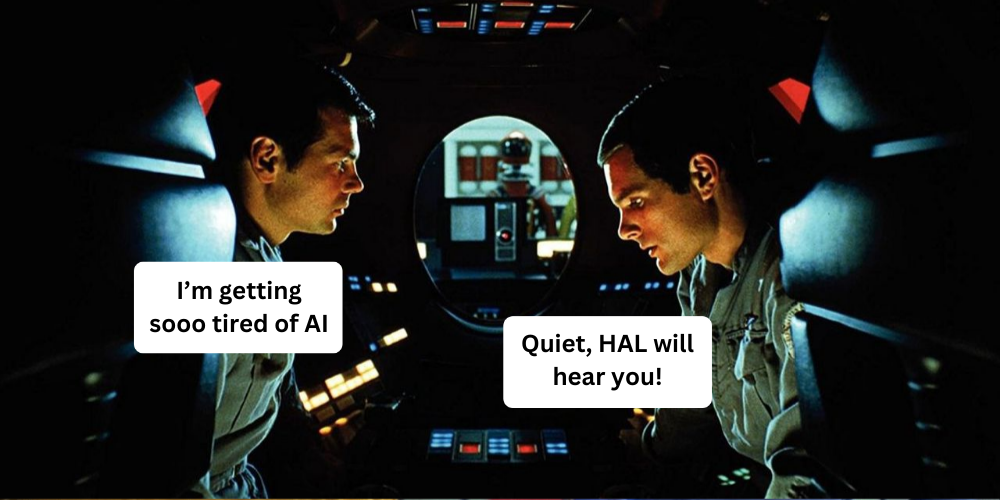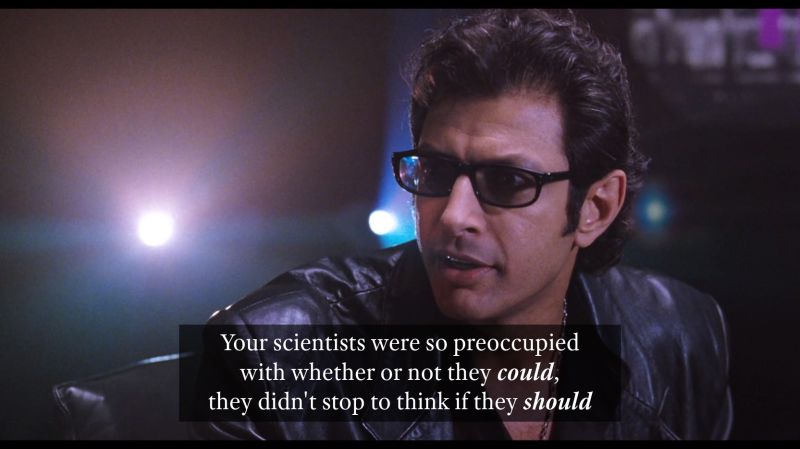Science fiction explores big ideas in a though-provoking manner, more so than any other genre.
- What if advanced AI became self-aware and demanded equal rights?
- What if we harnessed the power of black holes for interstellar travel?
- What if an alien species made first contact with Earth?
But how do science fiction writers come up with their ideas? And how can you, as an up-and-coming writer, generate ideas for an original science fiction short story or novel?
5 Ways to Generate Science Fiction Ideas
When I was younger, I was captivated by a TV series called The Ray Bradbury Theater. This anthology series featured dramatizations of the science fiction legend’s most beloved stories.
Each episode would begin with a shot of Bradbury in his office, gazing over the many mementos, curios and trinkets he’d collected during his life. In the introductory voiceover, Bradbury would describe this precious clutter as a rich source of story ideas:
People ask, where do you get your ideas? From right here. All of this is my Martian landscape. Somewhere in this room is an African veldt. Just beyond, perhaps, is a small Illinois town where I grew up. And I’m surrounded on every side by my magician’s toy shop. I’ll never starve here. I just look around, find what I need, and begin.
And he was right. Ideas are all around us. We can find them each time we turn on the news, or drive to work, or walk the aisles of a supermarket.
It’s all about perspective—the way we look at life and ponder its possibilities. If you tilt your head just right, and look at the world from a certain angle, you can find science fiction story ideas in just about anything.
Here are some rich sources and methods to get you started:
1. Read widely in the genre.
You’ve probably heard this one before, but it bears repeating.
Reading science fiction exposes you to a steady stream of intriguing ideas and concepts. More importantly, you get to see how the authors develop those ideas into fully formed stories—and how they make them exciting for the reader.

Every once in a while, I’ll be reading a science fiction book or watching a movie, and I’ll have one of those forehead-slapping moments. Wow, what a great idea for a story. I wish I’d thought of that myself! You’ve probably experienced this as well. But did you know that it’s brain food?
Reading science fiction on a regular basis trains your brain to think beyond our current reality. It teaches you to extrapolate, project, speculate and envision. Think of it like a workout for the creative “muscles” of the brain. The more you exercise them, the stronger they become.
Read the sub-genres you like most, as well as the ones you typically avoid. You’ll get value from all of it. None of it will be a waste of time.
Even when you read a story you don’t particularly care for, you’ll gain something from the experience. At the very least, you’ll figure out what kinds of stories and themes you like the most. Chances are, those are the types of stories you were born to write.
But the only way to figure all of this out is by reading widely.
2. Explore interesting ‘what-if’ scenarios.
I like to play the what-if game when exploring story possibilities. It’s deceptively simple. All you do is take an ordinary situation, topic or subject and transform it into an imaginative scenario by posing “what if” questions.
- What if dreams were gateways to alternate dimensions?
- What if humans discovered a way to teleport?
- What if we could reverse aging?
- What if we found a wormhole to another universe?
- What if we could clone humans?
- What if AI developed sentience—and resentment?
Explorative questions like these can help prime your imagination and, with a bit of fleshing out, lead to a fully developed sci-fi story concept.
The key is to build on them. By themselves, these what-if questions represent a premise or central idea for a story. But they need to be nurtured and expanded.
Once you find a what-if scenario you like, think about how it would affect people. Think about the complications, consequences and conflict that might arise from the scenario. You’ll find your story in there somewhere.
3. Study actual science and technology.
You don’t have to be a scientist to write good science fiction. Most well-known and highly successful sci-writers are not scientists. They’re idea makers. They examine the science and technology of today and look for interesting angles, future uses, potential problems, etc. These become the bones for a story.
But it all starts in the here and now. Before you can envision some otherworldly or far-future science fiction scenario, you have to study current capabilities.
Here’s an example to illustrate the point:
I’ve spent a lot of time researching AI for the book series I’m currently developing. I’m not a computer scientist or programmer—far from it. But I need to know enough about this technology and its future potential in order to find the story buried within it.
One day, while conducting such research, I stumbled across the concept of alignment as it relates to artificial intelligence (and its uglier cousin, misalignment).

“Alignment” is when an artificial intelligence system behaves in a way that is consistent with human values and goals. Misalignment occurs when the AI marches to its own drum, pursuing goals or objectives that are not in keeping with human desires.
This got me thinking: What if, in the not too distant future, a powerful and superintelligent AI developed its own values and goals. What if, for instance, it decided that protecting Planet Earth was priority #1, and that humans were the biggest threat to the planet. The story emerges!
Also, notice how this method overlaps with idea generation strategy #2, asking “what-if” questions. It’s a three-part process:
- Research a scientific or technological topic that fascinates you.
- Use what-if questions to speculate on problems or complications.
- Develop a scenario to show how these complications affect humanity.
Sci-fi is all about exploring the possibilities and consequences of science and technology. The more you know about these subjects, the more ideas you will have for your stories.
Dig into the science journals, the reports, the publicly available academic papers. Scour them for interesting concepts (like the misaligned AI that so intrigued me) and build a story around it.
4. Pay attention to current events.
Did you know that scientists recently discovered what’s inside the moon?
Or that they’re thinking about resurrecting the extinct Tasmanian tiger?
Or that they’re discovering ancient viruses in melting permafrost?
How do I know all of these interesting things? Because I headed over to Google News and entered the phrase “scientific breakthroughs.”
The Internet gives you access to all of the latest scientific breakthroughs and discoveries, along with academic debates and discussions as to their meaning. A science fiction writer from the 1970s would be incredibly jealous over the ease with which we can access such information. Yet many sci-fi writers take this for granted.
Some of the best stories in the history of science fiction were created by writers who paid attention to scientific developments and speculated about their meaning. Today, this kind of observation is easier than ever. It’s a feast for the writer’s soul.
Try it out for yourself:
- Choose an aspect of science or technology that interests you.
- Do a news search for “recent breakthrough” for that topic.
- Scan the headlines and summaries; read those that interest you.
In less than an hour, you’ll have more science fiction story ideas than you know that to do with. You’ll also be ahead of the pack in terms of fictionalizing them.
5. Consider ethical and philosophical questions.
There’s a great line in the movie Jurassic Park, when Dr. Malcolm is arguing against the park’s existence. At one point he tells the park’s creator: “your scientists were so preoccupied with whether or not they could that they didn’t stop to think if they should.”

This scene (and the novel it’s based on) raises serious ethical and philosophical questions. It questions the meaning of right versus wrong and warns of the consequences for playing god.
This is another way to come up with original science fiction ideas. Choose a scientific or technological concept that interests you—artificial intelligence, climate change, alien life, terraforming planets—and think about the ethical questions it opens up.
What Else Does This Article Need?
I’m transforming this website into a library of useful information and advice for science fiction writers. But to do that, I’ll need help from folks like you.
Is there something missing from this article? Some unexplored topic or angle that would make it more useful for up-and-coming science fiction writers?
Feel free to leave a comment or suggestion below!
